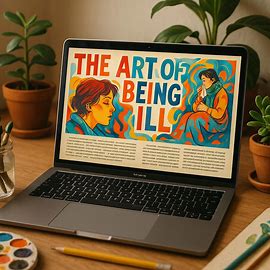Introduction
Illness often arrives uninvited, disrupting routines, ambitions, and the everyday flow of life. For many, falling sick can feel like a pause button pressed against their will, creating frustration and even anxiety. Yet, hidden within these moments of discomfort lies an opportunity—a chance to practice stillness, acceptance, and reflection. This perspective, sometimes referred to as the art of being ill, invites us to rethink how we relate to times of weakness.
Shifting From Resistance to Acceptance
When sickness strikes, the natural response is often resistance. People push themselves to continue working, fulfilling responsibilities, or maintaining their usual productivity. But resistance tends to prolong suffering. Acceptance, on the other hand, changes the dynamic.
The art of being ill doesn’t glorify sickness—it teaches us to soften into it, to acknowledge limitations without guilt. By resting when the body demands it, we allow healing to occur more naturally. Instead of asking, “Why now?” we can practice asking, “What do I need in this moment?” That subtle shift can transform illness from an obstacle into an experience of self-connection.
Slowing Down With Purpose
Modern life celebrates speed—quick meals, rapid responses, instant results. Illness forces a slowdown, often against our preferences. But if approached consciously, this slowdown can become meaningful.
During recovery, one might find time to read that long-postponed book, journal about emotions, or simply notice the stillness of the present moment. The art of being ill is about turning forced pauses into mindful pauses, where rest becomes restorative rather than frustrating.
The Hidden Lessons in Discomfort
Illness also has the power to highlight what we often overlook in daily life: the importance of health, the fragility of energy, and the value of supportive relationships. For some, being bedridden becomes a rare chance to evaluate priorities. Perhaps we realize how much we’ve been overcommitting or how little time we’ve spent truly listening to our body.
The lesson is not that sickness is desirable but that discomfort can be a teacher. When we see illness as part of the human journey rather than a detour from it, our relationship with it softens.
The Role of Kindness and Self-Compassion
Too often, people feel guilty when sick, especially in work-driven cultures that prize productivity. Practicing the art of being ill involves treating oneself with compassion. This might mean silencing the inner critic that says, “You’re lazy for resting,” and replacing it with a gentler reminder: “You are healing, and that is enough.”
Small acts of self-kindness—a warm cup of tea, cozy blankets, or even watching a comforting film—can transform recovery into a nurturing experience. Illness is not just about physical healing; it’s about emotional replenishment too.
Emerging Stronger
When health finally returns, we often step back into life with renewed clarity. The break, though unwanted, may leave behind gifts: an appreciation for wellness, a commitment to slower living, or a deeper respect for the body’s limits.
Ultimately, the art of being ill reminds us that sickness is not simply an interruption—it’s a chapter in the rhythm of human existence. By facing it with patience, compassion, and mindfulness, we turn even our weakest moments into sources of quiet strength.

